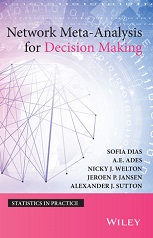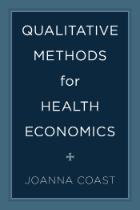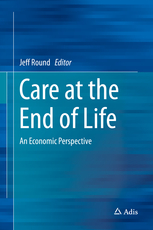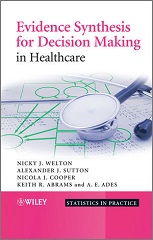HEHP books
This page describes recent books edited and authored by HEHP@Bristol staff.
Network Meta-analysis for Comparative Effectiveness Research, by Sofia Dias, A. E. Ades, Nicky J. Welton, Jeroen P. Jansen, Alexander J. Sutton

In the evaluation of healthcare, rigorous methods of quantitative assessment are necessary to establish which interventions are effective and cost-effective. Often a single study will not provide the answers and it is desirable to synthesise evidence from multiple sources, usually randomised controlled trials. This book takes an approach to evidence synthesis that is specifically intended for decision making when there are two or more treatment alternatives being evaluated, and assumes that the purpose of every synthesis is to answer the question “for this pre-identified population of patients, which treatment is ‘best’?”
A comprehensive, coherent framework for network meta-analysis (mixed treatment comparisons) is adopted and estimated using Bayesian Markov Chain Monte Carlo methods implemented in the freely available software WinBUGS. Each chapter contains worked examples, exercises, solutions and code that may be adapted by readers to apply to their own analyses.
This book can be used as an introduction to evidence synthesis and network meta-analysis, its key properties and policy implications. Examples and advanced methods are also presented for the more experienced reader.
Qualitative Methods for Health Economics, edited by Professor Joanna Coast

Qualitative methods are increasingly used within health economics research, but there is almost no specific material to guide the use of these methods in this context; there is very little that links them to the specific questions that (health) economists ask or that provides guidance on analyzing from an ‘economic’ or ‘resource-focused’ perspective.
Whilst the main themes within the book will look very similar to those in many other texts on qualitative research methods, they will:
- Apply the concepts familiar from qualitative methods to health economics issues in a way that is meaningful in this specific context;
- Work within an economic analytical approach where the analytic focus is on issues around scarcity and resource allocation;
- Incorporate examples that are relevant to health economists grappling with resource allocation problems in health care.
Care at the End of Life - An Economic Perspective, edited by Dr Jeff Round

This work carefully guides the reader through the methodological, policy and ethical challenges facing health economists conducting research in palliative care. It has collected the opinions of many cutting-edge researchers. Those who design and conduct economic evaluations or economics-related research in end of life populations will find this book thought provoking, instructive and informative.
The provision of care to individuals with disorders associated with advancing age, such as cancer and dementia, is an increasing concern amongst policy makers and providers of health and social care. Accordingly, the burden on state and private funders in providing care to patients with these complex illnesses is of growing importance to health economists. However, answering the questions raised by the research community on end of life and palliative care health economics has received little attention. The authors shed light on many questions including: Are economic evaluation methods fit for purpose in patients at the end of life? What is the best way to measure and value health outcomes in this population? What are the appropriate societal rules to govern resource allocation for people at the end of life? Are these people more or less deserving of resources than other patients? Does age matter? How can we define a good death for the purposes of resource allocation decision making? What ethics govern research in end of life patients?
Evidence Synthesis for Decision-Making in Healthcare, by Nicky J. Welton, Alexander J. Sutton, Nicola Cooper, Keith R. Abrams, A. E. Ades

In the evaluation of healthcare, rigorous methods of quantitative assessment are necessary to establish interventions that are both effective and cost-effective. Usually a single study will not fully address these issues and it is desirable to synthesize evidence from multiple sources. This book aims to provide a practical guide to evidence synthesis for the purpose of decision making, starting with a simple single parameter model, where all studies estimate the same quantity (pairwise meta-analysis) and progressing to more complex multi-parameter structures (including meta-regression, mixed treatment comparisons, Markov models of disease progression, and epidemiology models). A comprehensive, coherent framework is adopted and estimated using Bayesian methods.
